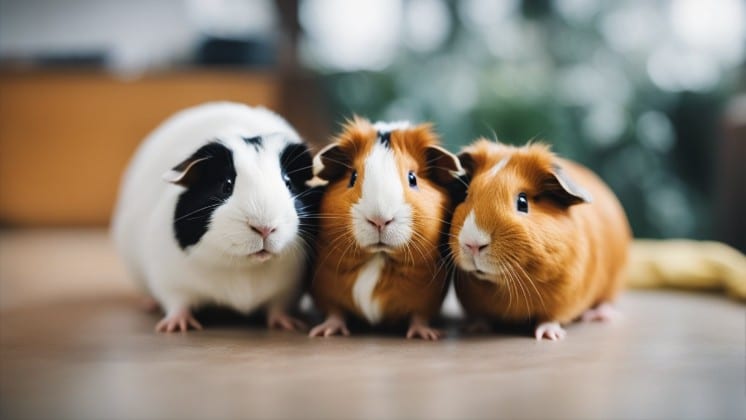Ferrets have gained popularity as exotic pets, known for their unique behaviors and interesting sounds.
They communicate through various noises, similar to laughter in humans, during play, enjoyment, or fear.
This article explores the different types of ferret noises, their meanings, and offers tips on interpreting and responding to these sounds for better communication with your pet ferret.
We’ll also provide tips on how to understand your ferret’s noises so you can effectively communicate with them.
Let’s dive right in.
What sound does a ferret make?
Ferrets make a variety of sounds to communicate. One common sound they make is a soft clucking noise when they are happy or excited. They also chirp, hiss, and even scream when they are scared or in pain. However, the most characteristic sound of a ferret is a soft dooking noise, which is a playful and happy sound.
Do ferrets purr?
While cats are known for their soothing purring sounds, ferrets have their own unique vocalizations that may be mistaken for purring.
Ferrets can make a soft clucking sound when they are content and relaxed, which some people describe as a purring noise.
This gentle clucking is one of the many sounds that ferrets make to communicate with their owners and other ferrets. It can indicate that your ferret is comfortable and happy in its environment. So, while
1. Squeaking
Ferrets are known for their squeaking, which they utilize to communicate. This sound is generally produced when a ferret is thrilled, pleased, or attempting to catch your attention.
They make this noise by emitting a high-pitched screech sound. They usually do it when startled, excited, or scared.
Pro tip: While some people find this noise cute, it can be quite annoying for others. If you’re considering getting a ferret, be sure to take their noise level into consideration.
While some people find the sound of a squeaking ferret to be annoying, others find it downright adorable.
2. Screaming/Yowling
This high-pitched noise is usually made when a ferret is excited or frightened, and it can be quite startling to hear. Another sound that ferrets commonly make is called yowling. This noise is similar to a cat’s meow, and it is often used as a way to get attention.
Any pet owner will tell you that their furry friend has unique personality traits that make them special.
One thing that all pet owners know, however, is that each type of animal has its own vocalizations that communicate different things.
For example, a dog might bark to signal that someone is at the door, while a cat might meow to ask for food. Similarly, ferrets have their own vocalizations that convey different messages.
One common sound that ferrets make is called “screaming.” While these sounds can be annoying at times, they are just one of the many things that make owning a ferret such a unique experience.
3. Hissing
This noise is made by forcing air through their throats and is actually somewhat similar to a cat’s “meow.” Ferrets make a hissing noise when they are afraid or angry. It’s their way of trying to scare away potential threats.
Ferrets are curious, active little creatures that make great pets. One of the things that ferrets are known for is their distinctive noise-making.
While it can be startling at first, most ferret owners quickly get used to it and even come to appreciate it as part of their pet’s personality.
If your ferret is hissing a lot, it’s probably just trying to tell you something. So take a moment to listen and see what your furry friend has to say.
4. Purring
Ferrets make a noise called purring when they are happy. Purring is a sign of contentment and is usually accompanied by relaxed body posture, soft eyes, and gentle grooming.
Like cats, ferrets can make a rumbling sound when they’re content or happy. This noise is produced by the movement of the diaphragm, and it’s usually most noticeable when they’re being petted or held as a way of showing affection.
So if you hear your ferret making this noise, there’s a good chance that they’re feeling relaxed and content.
5. Dooking
Ferrets make a noise called dooking because they are excited. They may dook when they see their owners, when they are playing, or when they are feeling happy.
Some people think the noise sounds like a duck, and that’s how it got its name!
Ferrets are known for being playful and curious creatures, but they can also be quite vocal. When they’re excited or happy, they often make a noise called ‘dooking.’
This high-pitched, stuttering sound is made by rapidly exhaling and inhaling, which can be quite loud.
Some ferret owners find dooking amusing, while others find it annoying.
In any case, it’s important to be aware that dooking is normal ferret behavior, and there’s no need to try to stop it.
6. Teeth grinding
This noise is made by rapidly vibrating the teeth, which usually indicates that the ferret is excited or happy.
A ferret that is teeth grinding usually depends on the context in which it is happening.
For example, if your ferret starts teeth grinding while you’re petting them, it’s probably a sign that they’re enjoying it.
But if they start teeth grinding while they’re in their cage, it might be a sign that they’re bored and looking for something to do.
Chattering can also be a sign that the ferret is looking for attention or trying to get someone to play with them. So, if you hear your ferret chattering away, it’s probably because they’re enjoying themselves.
7. Barking
Barking is a noise that ferrets make when they’re agitated or trying to get someone’s attention.
It’s usually not a sign of aggression, just like when dogs bark, most ferrets will stop once they’ve got your attention.
This can be surprising to those who are used to hearing dogs bark, but it is one of the things that makes ferrets such unique and interesting pets.
They are indeed interesting pets! But what defines them as exotic pets? That’s what we’ll be discussing in this article.
8. Whimpering and whining
In general, ferrets make a noise called whimpering when they are scared, hurt, or uncomfortable. It’s a way for them to communicate with us.
If you’re hearing your ferret whimpering, it’s important to pay attention and see if you can find out what’s wrong so you can help them feel better, perhaps by picking them up to offer them some comfort.
Some common reasons for fear or anxiety in ferrets include sudden loud noises, being around new people or animals, being in an unfamiliar place, and experiencing changes in routine.
If you can identify what’s causing your ferret to whimper, you can work on helping him feel more comfortable and reducing his fear or anxiety.
9. Whining
There can be several reasons why your ferret may be whining. Some common reasons include being hungry, needing to use the litter box, being thirsty, or feeling scared or uncomfortable.
While whining is actually a normal part of ferret communication (Ferrets use whining to express a variety of emotions, from excitement and happiness to fear), it is important to pay attention to the context and see if there are any underlying issues that need to be addressed.
10. Snoring
Ferret snoring is generally not a cause for concern, they snore just like humans, and dogs do when they sleep.
The good news is that there are a few things you can do to help reduce your ferret’s snoring. One option is to use a humidifier in your ferret’s room to keep the air moist.
You can also try elevating your ferret’s bed so that they sleep slightly upright. Lastly, make sure your ferret is getting plenty of exercise during the day as this can help to reduce nighttime snoring.
By taking these steps, you can help your ferret (and yourself!) get a good night’s sleep.
Do ferrets make noise at night?
Yes, ferrets can make noise at night. However, it is important to note that not all ferrets will make noise at night, and some may only make noise during the day.
If your ferret is making noise at night, it is important to determine why they are doing so.
Ferrets may make noise at night for a variety of reasons, including being bored, seeking attention, or trying to communicate something.
If your ferret is making noise at night, try to figure out what they are trying to communicate and see if there is anything you can do to help them (e.g., providing more toys or interaction during the day).
Do ferrets hiss when they play?
Many ferrets will hiss when they play, especially if they are excited or roughhousing. This is perfectly normal behavior and nothing to be concerned about. Hissing is simply one of the ways ferrets communicate with each other.
How do you know if your ferret is happy?
You might be wondering how to tell if your furry little friend is happy. After all, they can’t exactly tell you in words how they’re feeling. Fortunately, there are a few things you can look for that will give you a good idea of whether or not your ferret is content.
One of the biggest indicators of a happy ferret is its playfulness. If your ferret loves to play and seems to have endless energy, this is a good sign that they’re happy and enjoying life.
Another way to find out if your ferret is happy is their sleeping habits.
Ferrets typically sleep for about 15 hours each day, so if yours is getting a good amount of rest, it’s likely because they’re feeling relaxed and comfortable
Do ferrets laugh?
Yes, ferrets can laugh! In fact, they are quite vocal animals and will often make all sorts of sounds, including laughing.
Ferrets are very social creatures and love to play. So if you see your ferret making a giggling sound, it’s likely that he or she is just enjoying themselves.
Summary
Before we move on to the conclusion, we’ve summarized this article into a short list of key points for you to remember:
- Ferrets can whine for a variety of reasons, including being hungry, needing to use the litter box, being thirsty, or feeling scared or uncomfortable.
- Ferrets can make noise at night for various reasons, such as being bored or seeking attention.
- Ferrets will hiss when they play, and this is normal behavior.
- You can tell if your ferret is happy by looking at their level of energy and activity, as well as their sleeping habits.
Conclusion
In this article, we have looked at the different types of noises that ferrets make and what they might mean. Although it can be difficult to understand what your ferret is trying to say, pay attention to their body language and the context in which they are making the noise.
Overall, understanding ferret noises are important for any potential ferret owner. By taking the time to learn about the different types of sounds your pet can make, you’ll be able to better communicate with them and understand their needs.
Want to learn more about ferrets?
Ready to boost your knowledge to the next level? If so, check out the articles below:
- How Much Salmon Oil for Ferrets? (The Definitive Guide)
- 7 Things to Do With Ferrets on Vacation
- Can Ferrets Wear Collars? Explained ([year])





